Filter by

'A Brief Discourse of Rebellion and Rebels' by George North: A Newly Uncovere…
A new source for Shakespeare's plays, only recently uncovered, is investigated here with a full edition and facsimile of the text.
- Edition
- -
- ISBN/ISSN
- 9781787441842
- Collation
- -
- Series Title
- -
- Call Number
- -

Spiritual Shakespeares
Spiritual Shakespeares is the first book to explore the scope for reading Shakespeare spiritually in the light of contemporary theory and current world events. Ewan Fernie has brought together an exciting cast of critics in order to respond to the ‘religious turn’ in recent literary theory and to the spiritualized politics of terrorism and the ‘War on Terror’. Exploring a genuinely n…
- Edition
- -
- ISBN/ISSN
- 9780203625491
- Collation
- -
- Series Title
- -
- Call Number
- -
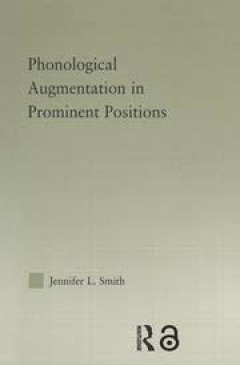
Phonological Augmentation in Prominent Positions
Phonologically prominent or "strong" positions are well known for their ability to resist positional neutralization processes such as vowel reduction or place assimilation. However, there are also cases of neutralization that affect only strong positions, as when stressed syllables must be heavy, default stress is inserted into roots, or word-initial onsets must be low in sonority. In this book…
- Edition
- -
- ISBN/ISSN
- 9780203506394
- Collation
- -
- Series Title
- -
- Call Number
- -

Theoretical Comparative Syntax Studies in Macroparameters
Collected for the first time in a single volume, these essays and articles by Naoki Fukui form an outline of some of the most significant and formative contributions to syntactic theory. Focusing particularly on the typological differences between English/type language and Japanese/type languages, Fukui examines the abstract parameters that both link and divide them. Linguistic universals are c…
- Edition
- -
- ISBN/ISSN
- 9780203479179
- Collation
- -
- Series Title
- -
- Call Number
- -

Testimony from the Nazi Camps French Women's Voices
This interdisciplinary study intergrates historiographical, literary and cultural methodologies in its focus on a little known corpus of testimonial accounts published by French women deported to Nazi camps. Comprising epistemological and literary analyses of the accounts and an examination of the construction of deportee identities, it will interest those working in the fields of modern French…
- Edition
- -
- ISBN/ISSN
- 9780203339787
- Collation
- -
- Series Title
- -
- Call Number
- -
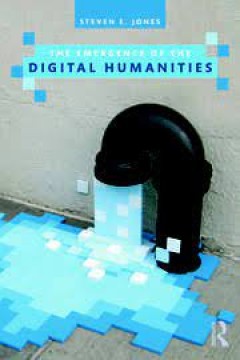
The Emergence of the Digital Humanities
The past decade has seen a profound shift in our collective understanding of the digital network. What was once understood to be a transcendent virtual reality is now experienced as a ubiquitous grid of data that we move through and interact with every day, raising new questions about the social, locative, embodied, and object-oriented nature of our experience in the networked world. In The…
- Edition
- -
- ISBN/ISSN
- 9780203093085
- Collation
- -
- Series Title
- -
- Call Number
- -
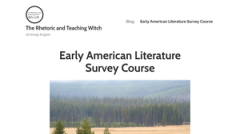
Early American Literature Survey Course : The Rhetoric and Teaching Witch
This course is a survey of Early American Literature (beginnings to 1890). The course includes suggested assignments, a course outline, and a MS Word text of Public Domain readings. This course is designed for a 16 week semester
- Edition
- -
- ISBN/ISSN
- -
- Collation
- -
- Series Title
- -
- Call Number
- 800 COO e

Bridge the Distance : An Oral History of COVID-19 in Poems
Overview: During the early days of quarantine, many teachers turned to poetry to process their experiences. Teacher-Poets Writing to Bridge the Distance: An Oral History of COVID-19 preserves this poetry and teachers' experiences as they navigated a new reality in education.
- Edition
- -
- ISBN/ISSN
- -
- Collation
- -
- Series Title
- -
- Call Number
- 420 WOO b
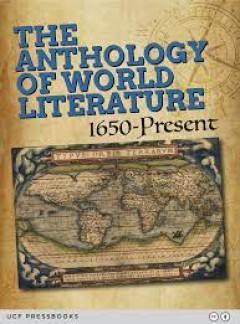
The Anthology of World Literature 1650-present
Overview: By engaging with this resource which presents texts by diverse world writers from 1650 to the present, learners will: (1) engage with diverse world writers in translation, including canonical and less canonical texts, and (2) identify literary conventions and trends across genres. The texts are in chronological order, but can be adapted by the faculty in whatever way they see fit. Eac…
- Edition
- -
- ISBN/ISSN
- -
- Collation
- -
- Series Title
- -
- Call Number
- 418.4 HOH a
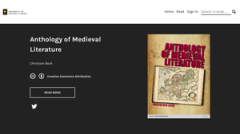
Anthology of Medieval Literature
This e-text of Medieval literature provides a variety of readings that can be used for English literature courses and contains public domain, Creative Commons licensed images, and works for which permissions have been obtained to include in this anthology
- Edition
- -
- ISBN/ISSN
- -
- Collation
- -
- Series Title
- -
- Call Number
- 418.4 ANT
 Computer Science, Information & General Works
Computer Science, Information & General Works  Philosophy & Psychology
Philosophy & Psychology  Religion
Religion  Social Sciences
Social Sciences  Language
Language  Pure Science
Pure Science  Applied Sciences
Applied Sciences  Art & Recreation
Art & Recreation  Literature
Literature  History & Geography
History & Geography